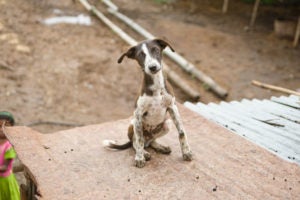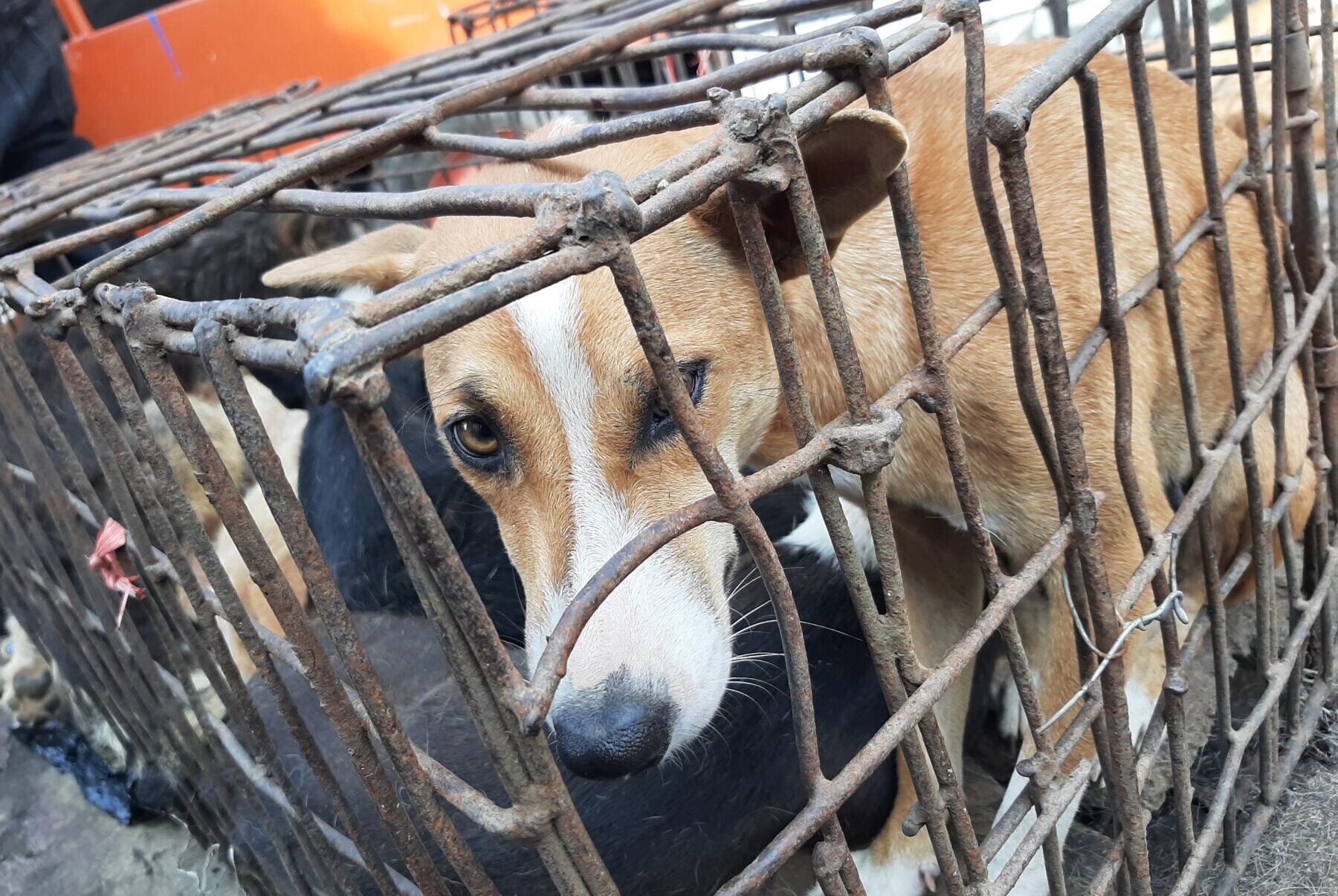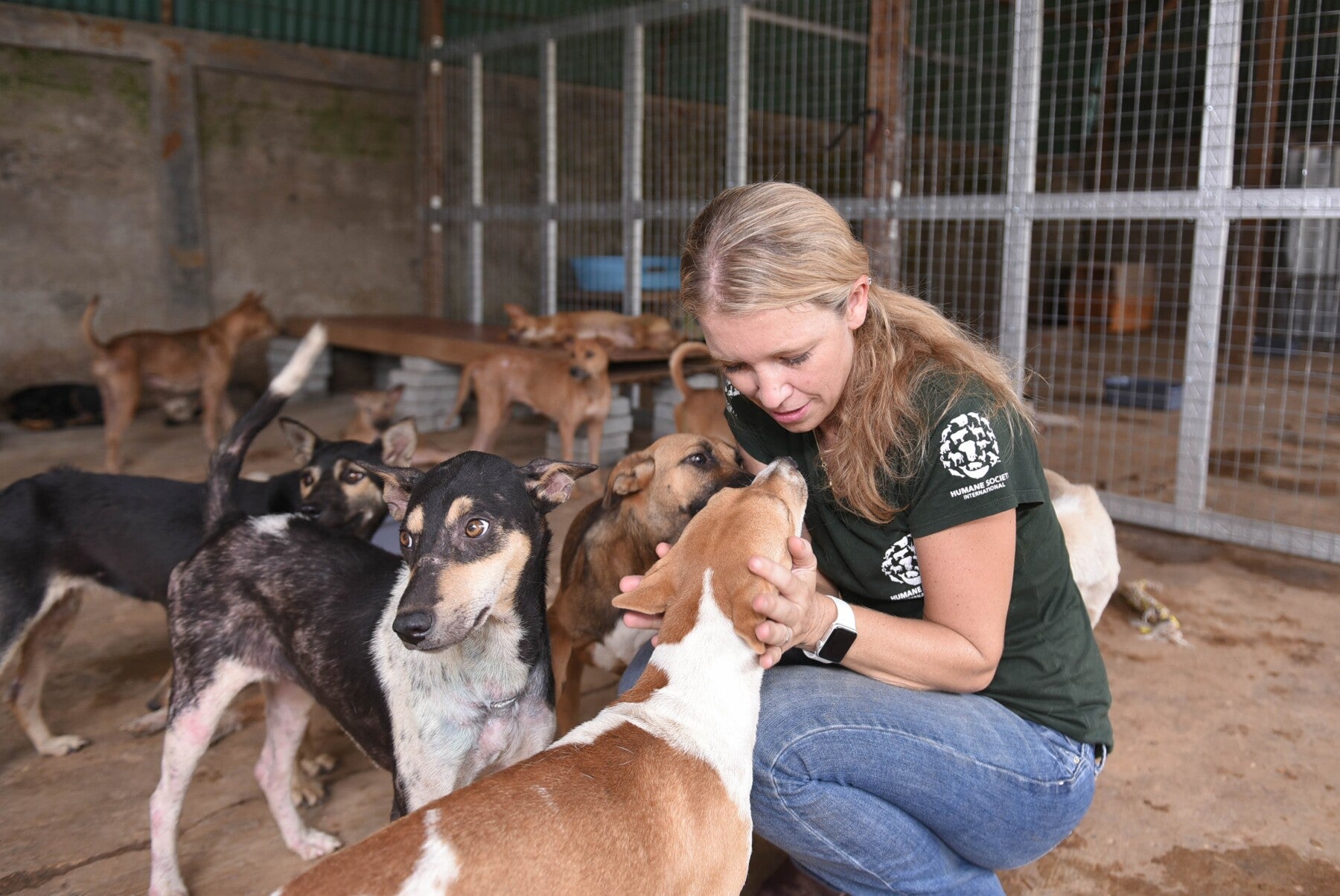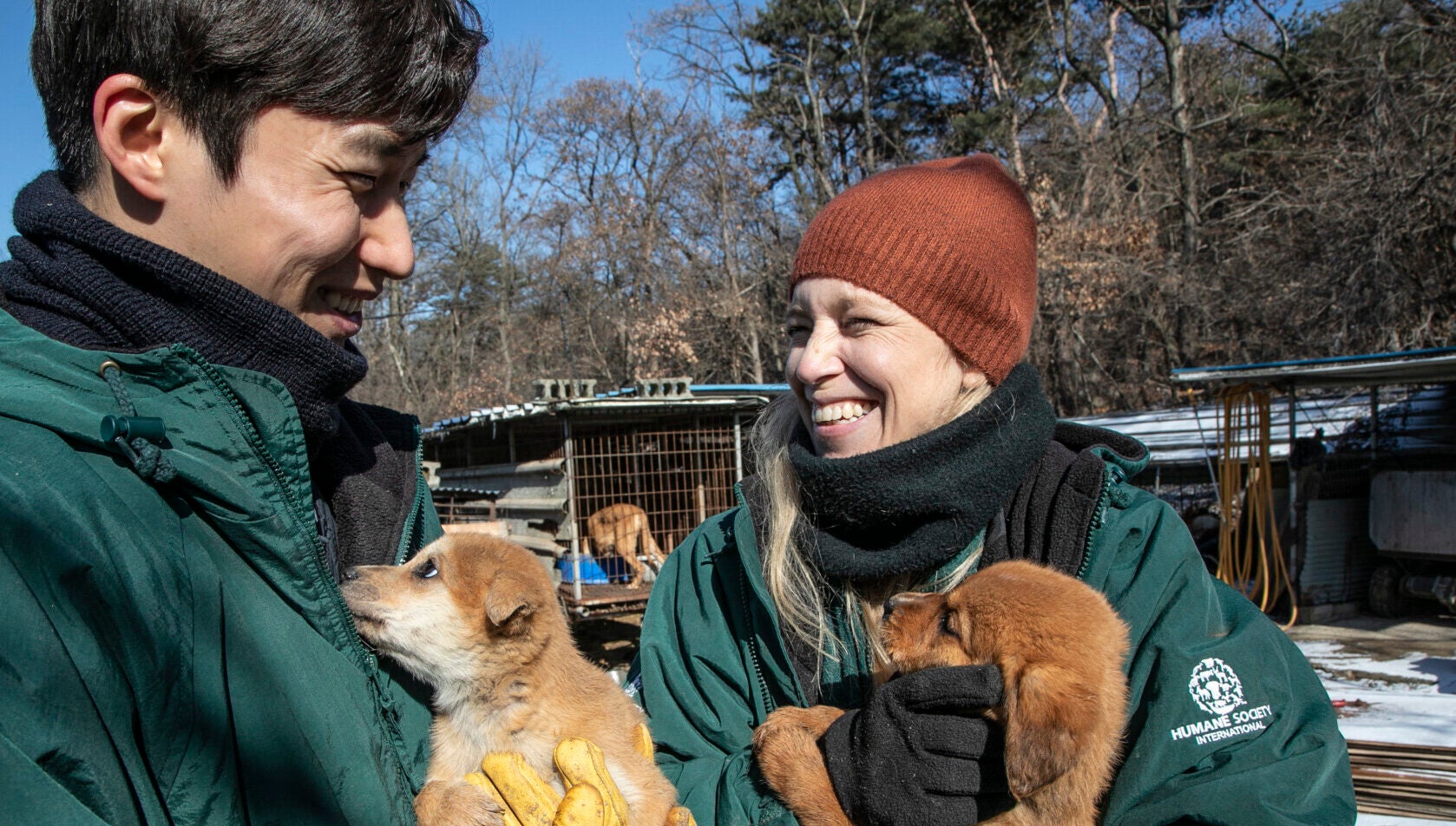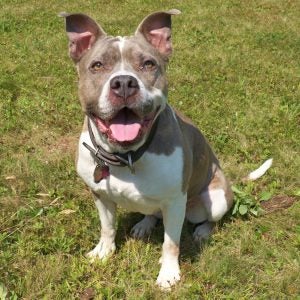HSI/Canada recherche des bénévoles pour donner de leur temps et partager leurs compétences professionnelles.
Si vous souhaitez apporter votre aide de temps à autre chaque mois, déposez votre candidature pour l’un des postes suivants :
Refuge d’urgence-équipe sauvetage (Québec, Ontario)
Dirigeant(e) communautaire (Québec, Ontario, Colombie-Britannique)
Infographiste
Traducteur/rice (de l’anglais vers le français)
Chargé(e) de liaison avec les médias
Vétérinaire
Technicien(ne) en santé animale
Chargé(e) de liaison (Campagne Non à la Cruauté)
Soutien administratif (Campagne Non à la Cruauté)
Assistant(e) services aux donateurs et donatrices
Que faire si les postes de bénévoles ne vous correspondent pas…Devenez un ou une de nos alliés! Aidez-nous à intervenir sur les questions et les campagnes pressantes concernant le bien-être des animaux. En tant qu’alliés, vous serez contactés lorsque des mesures urgentes sont nécessaires concernant des enjeux susceptibles de vous intéresser. Aucun minimum d’heures requis pour être inscrit(e) sur cette liste. Nous serions très heureux de vous avoir dans notre équipe en tant qu’alliés des animaux.
Refuge d’urgence-equipe sauvetage
Nous recherchons des bénévoles qui souhaitent aider les animaux dans des refuges temporaires au Québec et en Ontario. Pour plus d’information sur cette position, veuillez cliquer ici.
Dirigeant(e) communautaire
Vous voulez aider HSI/Canada à construire un mouvement pour la protection des animaux encore plus fort? Envisagez de jouer un rôle de premier plan en envoyant votre candidature pour le poste de dirigeant(e) communautaire.
Les dirigeant(e)s communautaires sont au cœur des efforts de HSI/Canada pour célébrer les animaux et lutter contre la cruauté.
En tant que dirigeant(e) communautaire, vous serez l’ambassadeur(rice) de HSI/Canada dans votre secteur afin de faire avancer les différentes campagnes sur le bien-être des animaux et les priorités législatives.
Les bénévoles apporteront leur aide pour :
- Soutenir les efforts de HSI/Canada pour faire adopter des lois fédérales, provinciales et municipales sur le bien-être des animaux en aidant dans la recherche, les tâches administratives et la défense des intérêts dans le domaine politique,
- Construire un réseau de partenaires pour HSI/Canada qui agiront en faveur des enjeux pour la protection des animaux,
- Sur les conseils et les directives de notre responsable politique et de notre gestionnaire de bénévoles, développer et mettre en place des initiatives locales de protection des animaux dans votre municipalité, province ou comté fédéral, selon les priorités de la campagne de HSI/Canada,
- Rédiger des lettres aux rédacteurs des journaux locaux et nationaux,
- • Aider à gérer les kiosques d’information lors d’événements locaux pour faire avancer les différentes priorités législatives pour la protection des animaux.
Nous recherchons des bénévoles avec les qualités suivantes :
- Engagement à l’égard de la mission de HSI/Canada
- Excellentes aptitudes et expérience dans un rôle de leadership
- Fort attachement à leur communauté
- Très bonnes compétences relationnelles et la capacité de communiquer avec diverses personnes efficacement et sans jugement
- Solides connaissances en informatique, recherches en ligne et compétences rédactionnelles, maîtrise de Microsoft Office, Word et Excel, et une connaissance générale des réseaux sociaux
- Aptitude à prendre des initiatives et à s’adapter rapidement aux changements
- Capacité à travailler en équipe et de manière autonome
- Résidant dans les provinces du Québec, de l’Ontario ou de la Colombie-Britannique.
Les dirigeant(e)s communautaires s’engagent en moyenne à une à trois heures de travail par semaine pour un an minimum. Cet engagement varie selon les semaines. Une participation continue est souhaitée. Après avoir étudié votre candidature, un membre du personnel vous invitera à un entretien virtuel en ligne. Si nous déterminons mutuellement que l’opportunité vous convient, vous obtiendrez le poste de bénévole.
Veuillez lire la description complète pour ce poste.
Veuillez noter que le lien mène vers le système de programme de bénévolat de notre organisation partenaire, The HSUS, qui a bien voulu le partager avec nous [en anglais seulement].
Remplir votre formulaire de candidature dès maintenant
Infographiste
Nous recherchons des bénévoles talentueux en infographie et/ou en publication assistée par ordinateur afin de nous aider à concevoir des visuels créatifs pour nos campagnes de façon ponctuelle.
Les bénévoles apporteront leur aide pour :
- Créer des supports promotionnels pour des événements, comme des affiches, des bannières à dérouler et des tracts,
- Concevoir la mise en page des rapports, brochures, tracts, etc.,
- Réaliser l’infographie pour des campagnes spécifiques.
Nous recherchons des bénévoles avec les qualités suivantes :
- Expérience dans l’utilisation d’outils de conception comme la Suite Adobe Creative, notamment InDesign
- Compétences évidentes en conception graphique et/ou en publication assistée par ordinateur
- Aptitude à suivre des instructions, à travailler selon les directives de la marque de l’organisation et effectuer un travail de haute qualité dans de courts délais
- Une certaine affinité avec la protection des animaux et les objectifs de HSI/Canada
Nous demandons un engagement de seulement quelques heures par mois (selon nos besoins) sur une période minimum de six mois. Les bénévoles peuvent travailler à distance et être situés n’importe où au Canada. Les candidat(e)s devront soumettre leur CV, une lettre de motivation et un petit portfolio de leur travail.
Veuillez lire la description complète pour ce poste.
Veuillez noter que le lien mène vers le système de programme de bénévolat de notre organisation partenaire, The HSUS, qui a bien voulu le partager avec nous [en anglais seulement].
Remplir votre formulaire de candidature dès maintenant
Traducteur/rice
Nous recherchons des bénévoles avec de l’expérience en traduction de l’anglais vers le français pour traduire nos principaux documents pour les campagnes de protection des animaux de façon ponctuelle.
Les bénévoles apporteront leur aide pour :
- Traduire les lettres pour le Parlement et d’autres documents de lobbying, de l’anglais vers le français,
- Traduire les communiqués de presse, les publications de réseaux sociaux et d’autres documents de communication externe,
- Révision de texte (en français seulement).
Nous recherchons des bénévoles avec les qualités suivantes :
- Capacité à traduire le français ou l’anglais comme langue maternelle
- Aptitude à traduire de l’anglais vers le français à un niveau professionnel
- Capacité à réaliser des traductions de très bonne qualité et à respecter des délais serrés
- Capacité à bien travailler de façon indépendante
- Une certaine affinité avec la protection des animaux et les objectifs de HSI/Canada.
Nous demandons un engagement de seulement quelques heures par mois (selon nos besoins) sur une période minimum de six mois. Les bénévoles peuvent travailler à distance et être situés n’importe où au Canada. Les candidat(e)s devront soumettre leur CV et une lettre de motivation. La candidature sera acceptée à condition de réussir un test.
Veuillez lire la description complète pour ce poste.
Veuillez noter que le lien mène vers le système de programme de bénévolat de notre organisation partenaire, The HSUS, qui a bien voulu le partager avec nous [en anglais seulement].
Remplir votre formulaire de candidature dès maintenant
Chargé(e) de liaison avec les médias
Nous recherchons des bénévoles avec de l’expérience en communication pour nous aider à sensibiliser les médias et à rédiger les principaux documents pour nos diverses campagnes.
Les bénévoles apporteront leur aide pour :
- Rédiger des articles, des articles d’opinion et des présentations pour les médias locaux sur les problématiques du bien-être des animaux,
- Contacter (par téléphone ou courriel) les médias, leur demander/les encourager à publier des histoires sur le bien-être des animaux,
- Développer des relations avec les journalistes qui traitent nos problématiques,
- Déterminer si les histoires ont été publiées en regardant en ligne ou en contactant le média/journaliste par téléphone/courriel, puis rassembler les résultats dans un rapport mensuel,
- Se connecter et collaborer avec les personnes influentes des réseaux sociaux pour partager notre contenu.
Nous recherchons des bénévoles avec les qualités suivantes :
- Intérêt pour le bien-être et la protection des animaux
- Maîtrise de Microsoft Office
- Souci du détail
- Excellentes compétences de communication en anglais; le français courant est un atout
- Expérience – formation en journalisme, marketing ou communication.
Nous demandons un engagement de seulement quelques heures par mois (selon nos besoins) sur une période minimum de trois mois. Les bénévoles peuvent travailler à distance et être situés n’importe où au Canada. Les candidat(e)s devront soumettre leur CV et une lettre de motivation. La candidature sera acceptée à condition de réussir un test.
Veuillez lire la description complète pour ce poste.
Veuillez noter que le lien mène vers le système de programme de bénévolat de notre organisation partenaire, The HSUS, qui a bien voulu le partager avec nous [en anglais seulement].
Remplir votre candidature dès maintenant
Vétérinaire
Nous recherchons un(e) vétérinaire qui souhaite aider bénévolement les animaux dans un refuge temporaire ou lors de nos interventions de sauvetage animalier.
Les bénévoles apporteront leur aide pour :
- Apporter un soutien technique pendant les examens vétérinaires initiaux ou ultérieurs, notamment pour immobiliser les animaux et archiver des données,
- Administrer des vaccins et d’autres traitements prescrits,
- Analyser les fonctions vitales des animaux des refuges et recommander au responsable d’éventuels examens de suivi, au besoin,
- Réaliser des opérations de stérilisation sur les chats et les chiens lors des cliniques de stérilisation de masse.
Nous recherchons des bénévoles avec les qualités suivantes :
- Capacités à répondre aux exigences mentionnées dans le document Compétences nécessaires, avec ou sans accommodements raisonnables
- Excellentes compétences organisationnelles et un grand sens du détail
- Licence pour pratiquer la profession de vétérinaire conformément aux normes provinciales.
Nous demandons un engagement d’un an et une participation à au moins une intervention par an. Les bénévoles travailleront généralement de longues journées, environ 10 heures par jour pendant les interventions.
Veuillez lire la description complète pour ce poste.
Veuillez noter que le lien mène vers le système de programme de bénévolat de notre organisation partenaire, The HSUS, qui a bien voulu le partager avec nous [en anglais seulement].
Remplir votre formulaire de candidature dès maintenant
Technicien(ne) en santé animale
Nous recherchons un(e) technicien(ne) en santé animale pour aider les animaux dans un refuge temporaire ou lors de nos interventions de sauvetage animalier.
Les bénévoles apporteront leur aide pour :
- Apporter un soutien technique pendant les examens vétérinaires initiaux ou ultérieurs, notamment pour immobiliser les animaux et archiver des données,
- Apporter un soutien aux vétérinaires sur place.
Nous recherchons des bénévoles avec les qualités suivantes :
- Capacités à répondre aux exigences mentionnées dans le document Compétences nécessaires, avec ou sans accommodements raisonnables
- Excellentes compétences organisationnelles et un grand sens du détail.
Nous demandons un engagement d’un an et une participation à au moins une intervention par an. Les bénévoles travailleront généralement de longues journées, environ 10 heures par jour pendant les interventions.
Veuillez lire la description complète pour ce poste.
Veuillez noter que le lien mène vers le système de programme de bénévolat de notre organisation partenaire, The HSUS, qui a bien voulu le partager avec nous [en anglais seulement].
Remplir votre formulaire de candidature dès maintenant
Chargé(e) de liaison (Campagne Non à la Cruauté)
Nous recherchons des bénévoles qui nous aideront à développer notre capacité de promotion de la campagne #NonALaCruaute/Mettre fin aux expérimentations animales dans les écoles primaires et secondaires, les universités et autres organisations et institutions importantes dans tout le Canada.
Les bénévoles apporteront leur aide pour :
- Rechercher des écoles, des commissions scolaires, des universités et d’autres organisations et associations pertinentes et trouver la personne appropriée à approcher avec la campagne #NonALaCruaute /Mettre fin aux expérimentations animales,
- Sous les directives du personnel, contacter les institutions pour leur demander de participer à la campagne canadienne # NonALaCruaute ainsi que la campagne générale visant à mettre fin aux expérimentations animales,
- Sous les directives du personnel, rechercher des articles sur l’expérimentation animale dans les cosmétiques et ses alternatives, les produits cosmétiques non testés sur les animaux; les célébrités qui utilisent les produits cosmétiques non testés sur les animaux et qui se soucient du bien-être des animaux, les institutions qui n’ont pas recours aux tests sur les animaux, etc., et préparer des publications pour les réseaux sociaux,
- Développer et aider à la création de nouvelles ressources et stratégies pour promouvoir la campagne # NonALaCruaute /Mettre fin aux expérimentations animales au Canada,
- Contribuer aux réunions et aux présentations pour les représentants du gouvernement et les coordinateurs pour promouvoir la campagne # NonALaCruaute au Canada et/ou d’autres initiatives de la campagne visant à mettre fin aux expérimentations animales.
Nous recherchons des bénévoles avec les qualités suivantes :
- Excellentes aptitudes en communication orale et écrite, en français et/ou en anglais
- Intérêt pour la protection des animaux
- Capable de travailler correctement de façon indépendante et de faire preuve de discernement
- Connaissance des fonctions de base de Microsoft Excel, Word et PowerPoint, de Google docs et des outils de recherche en ligne
- Certaines formations universitaires sont souhaitées : avoir étudié idéalement dans les secteurs de la communication, de la politique, de l’éducation, de l’environnement/du développement durable, de l’éthique, et/ou du bien-être des animaux.
Nous demandons un engagement d’un minimum de trois mois, 3 heures par semaine.
Veuillez lire la description complète pour ce poste.
Veuillez noter que le lien mène vers le système de programme de bénévolat de notre organisation partenaire, The HSUS, qui a bien voulu le partager avec nous [en anglais seulement].
Remplir votre formulaire de candidature dès maintenant
Soutien administratif (Campagne Non à la Cruauté)
Nous recherchons des bénévoles pour apporter un soutien administratif au Responsable de campagne pour augmenter ses capacités à atteindre les objectifs.
Les bénévoles apporteront leur aide pour :
- Apporter un soutien administratif général, notamment l’archivage, la saisie de données, une aide au publipostage, la mise à jour des fichiers Excel, des photocopies, etc.,
- Aider à organiser et à préparer les ressources de diffusion.
Nous recherchons des bénévoles avec les qualités suivantes :
- Très bonnes compétences en communication
- Aptitude à apprendre et à montrer une connaissance des programmes de HSI/Canada
- Capacité à comprendre les politiques et les positions de HSI/Canada tout en les représentant de manière adéquate lors d’interaction avec le public ou en représentant HSI/Canada dans d’autres circonstances
- Capacité à apprendre et à montrer une connaissance des principales campagnes et missions de HSI/Canada
- Expérience dans l’administration un atout.
Nous demandons un engagement pour un minimum de trois mois, 1 à 2 heures par semaine.
Veuillez lire la description complète pour ce poste.
Veuillez noter que le lien mène vers le système de programme de bénévolat de notre organisation partenaire, The HSUS, qui a bien voulu le partager avec nous [en anglais seulement].
Remplir votre formulaire de candidature dès maintenant
Assistant(e) services aux donateurs et donatrices
Nous recherchons des bénévoles pour apporter au Directeur du développement (service de collecte de fonds) un soutien dans la recherche afin de développer ses capacités pour atteindre les objectifs.
Les bénévoles apporteront leur aide pour :
- Rechercher comment attirer la Génération Y à contribuer financièrement à la cause,
- Rechercher comment recruter/développer un programme de legs,
- Rechercher des stratégies de financement participatif et d’autres opportunités de collecte,
- • Rechercher des donateurs et donatrices importants et des rapports annuels.
Nous recherchons des bénévoles avec les qualités suivantes :
- Très bonnes compétences en communication
- Aptitude à apprendre et à montrer une connaissance des programmes de HSI/Canada
- Capacité à comprendre les politiques et les positions de HSI/Canada tout en les représentant de manière adéquate lors d’interaction avec le public ou en représentant HSI/Canada dans d’autres circonstances
- Capacité à apprendre et à montrer une connaissance des principales campagnes et missions de HSI/Canada
- Une expérience dans le développement et la collecte de fonds est un avantage..
Nous demandons un engagement d’un minimum de trois mois, 1 à 2 heures par semaine.
Veuillez lire la description complète pour ce poste.
Veuillez noter que le lien mène vers le système de programme de bénévolat de notre organisation partenaire, The HSUS, qui a bien voulu le partager avec nous [en anglais seulement].
Remplir votre formulaire de candidature dès maintenant

